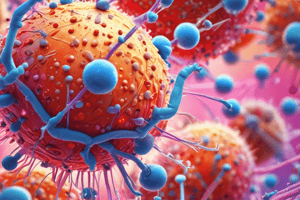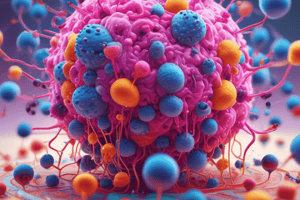Podcast
Questions and Answers
Which phase of the immune response is non-specific and does not need to recognize the pathogen?
Which phase of the immune response is non-specific and does not need to recognize the pathogen?
- T cells
- Innate immune response (correct)
- Adaptive immune response
- Skin and mucosal membranes
What is the body's initial line of defense in the immune system?
What is the body's initial line of defense in the immune system?
- B cells
- Skin and mucosal membranes (correct)
- T cells
- Natural killer (NK) cells
Which type of immunity is characterized by the ability to 'remember' the invading substance?
Which type of immunity is characterized by the ability to 'remember' the invading substance?
- Innate immunity
- Acquired immunity (correct)
- Antibody-mediated immunity
- Passive immunity
Which immune cells are involved in phagocytosis to engulf and destroy pathogens?
Which immune cells are involved in phagocytosis to engulf and destroy pathogens?
Which cells are activated in the adaptive immune response to neutralize pathogens?
Which cells are activated in the adaptive immune response to neutralize pathogens?
Which term refers to a disorder where the immune system mistakenly attacks healthy cells?
Which term refers to a disorder where the immune system mistakenly attacks healthy cells?
What is the main difference between innate immunity and adaptive immunity?
What is the main difference between innate immunity and adaptive immunity?
Which immune cells are responsible for producing antibodies?
Which immune cells are responsible for producing antibodies?
What type of immune cells directly kill virus-infected cells?
What type of immune cells directly kill virus-infected cells?
Which immune system disorder results in the immune system attacking the body's own tissues?
Which immune system disorder results in the immune system attacking the body's own tissues?
How do vaccines work to stimulate the body's immune response?
How do vaccines work to stimulate the body's immune response?
Which type of immunity involves barriers like skin and mucous membranes?
Which type of immunity involves barriers like skin and mucous membranes?
Study Notes
The Immune System: A Complex Guardian
The immune system is a vast network of cells, tissues, and organs that work together to protect our body from infections, diseases, and foreign invaders. This intricate system is constantly monitoring our environment, ready to spring into action when needed. Let's delve into the essential components of the immune system, exploring the immune response, types of immunity, immune cells, and immune system disorders.
Immune Response
When a foreign substance or pathogen enters the body, the immune system responds using a series of complex processes called the immune response. This response involves two main phases: the innate immune response and the adaptive immune response.
-
Innate Immune Response: This is the body's initial line of defense. It is non-specific and does not need to recognize the pathogen. The innate immune response involves physical barriers like the skin and mucosal membranes, as well as cellular components such as white blood cells like phagocytes and natural killer (NK) cells.
-
Adaptive Immune Response: This response is specific to the pathogen and is characterized by the ability to "remember" the invading substance. The adaptive immune response is initiated by the activation of T cells and B cells, which work together to neutralize, eliminate, or contain the pathogen.
Types of Immunity
There are two main types of immunity:
-
Innate Immunity: This form of immunity is present from birth and does not require prior exposure to a pathogen. Innate immunity involves physical barriers, such as the skin and mucous membranes, as well as cellular components like phagocytes, NK cells, and complement proteins.
-
Adaptive Immunity: This form of immunity is acquired throughout life, and it requires exposure to a pathogen. Adaptive immunity involves specific recognition of pathogens and the ability to "remember" them for a faster response upon subsequent encounters.
Immune Cells
-
Phagocytes: These immune cells engulf and destroy pathogens and cellular debris through a process called phagocytosis. Examples of phagocytes include macrophages, neutrophils, and dendritic cells.
-
T cells: These cells play a crucial role in the adaptive immune response. T cells can be further divided into two main types: (a) cytotoxic T cells (CD8+ T cells) that directly kill virus-infected cells and (b) helper T cells (CD4+ T cells) that help B cells and cytotoxic T cells to eliminate pathogens.
-
B cells: These cells are responsible for producing antibodies, which are proteins that can bind to specific pathogens and neutralize them. B cells also present antigens to helper T cells to initiate the adaptive immune response.
Immune System Disorders
Several diseases can negatively impact the immune system, either by weakening it or causing it to overreact. Some examples include:
-
Autoimmune diseases: In these conditions, the immune system mistakenly attacks the body's own tissues. Examples include rheumatoid arthritis, lupus, and multiple sclerosis.
-
Immunodeficiency disorders: These conditions result in a weakened immune system, making it difficult for the body to fight off infections. Examples include HIV/AIDS, severe combined immunodeficiency (SCID), and primary immunodeficiency disorders.
-
Allergies: Allergies are a type of hypersensitivity reaction caused by an exaggerated immune response to harmless substances, such as pollen, food, or animals.
Vaccines
Vaccines are a safe and effective way to stimulate the body's adaptive immune response to a specific pathogen without causing the disease. Vaccines work by introducing a harmless form of the pathogen or its components to the body, which helps the immune system "learn" to recognize and respond to the actual pathogen if it is encountered in the future. Vaccines have significantly reduced the incidence and mortality of numerous diseases, including smallpox, polio, and measles.
In summary, the immune system is a complex network of cells, tissues, and organs that protects the body from infections and diseases. It comprises two main types of immunity, innate and adaptive, and includes various immune cells such as phagocytes, T cells, and B cells. Immune system disorders can negatively impact the body's defense mechanisms, and vaccines are an effective tool for preventing disease.
Studying That Suits You
Use AI to generate personalized quizzes and flashcards to suit your learning preferences.
Description
Explore the intricate network of the immune system, its essential components, types of immunity, immune response mechanisms, immune cells, common immune system disorders, and the importance of vaccines. Test your knowledge on this complex guardian of the human body!




